Reading time: About 7 minutes, 1400 words
Get 7 for Sunday in your inbox. → Subscribe here.
This issue is https://7forsunday.com/50
Scree
noun : an accumulation of loose stones or rocky debris lying on a slope or at the base of a hill or cliff.
Meh
In March of 2022 I returned to tracking my activity. For me, what gets tracked gets optimized. I created the simplest tracking worksheet that did what I wanted and I set about keeping track. There are things I loath about my current FitBit; I can’t quite entirely disable the notifications. And touch screens don’t work with sweaty fingers, which leads to frustration just when I’m exhausted. I’ve never had an Apple Watch, but maybe it was time?
When I bought the phone last year, I went all out. I got the 1 terabyte model (a ridiculous amount of storage space, in hindsight), because I expected to have the thing for a while. But I’ve come to resent this phone.
~ Chris Bailey from, Smartphones should not be this nice – Chris Bailey
slip:4ucisa1.
I went to the Apple Store to arrange for a battery replacement for my iPhone, and I intended to spend my waiting time examining watches. I spent an hour exploring and testing, and picked one out. I bought it, booted it up, synced it to my Apple ecosystem, and strapped it on. I went on my way with a new phone battery and $700 in conspicuous consumption on my wrist. Intending to lean into wearing and using the watch as much as possible.
And for the next two days I wanted to rip it off my wrist and smash it with a hammer. I spent endless hours trying to disable this, silence that, adjust this feature, avoid setting up that other feature… All because I wanted the Watch’s better GPS tracking of distance covered, and better biometric measurements. I struggled with trying to sleep with a digital screen strapped to my wrist—there is no digital screen that will ever exist, which is permitted in my sleep space. Alas, the Watch is the antithesis of calm technology and it was clear I was never going to change its DNA.
On the third day, I carefully put it all back in its packaging as best I could. I drove all the way back to the Apple Store. I knew Apple had a 7-day, no questions asked, full money back guarantee. I handed it back to a rep. They of course asked, “Was there a problem? Or something you didn’t like?” My reply—
“Meh.” And then I left.
ɕ
Somewhat wacky
At this point I’m resigned to my nature being unchangeable. I need structure to work within, and I cannot suffer long stretches of boredom. I’m comfortable knowing that at least some of what I do makes the world a better place; I’m comfy with my internal validation. I also know that if I start to focus too much on making money I lose my spark. What I’m left wondering is wether there is some thing focused enough that people could dig in and follow (in the sense of deeply understanding the thing, my motivations, and my goal.) I’m certain however, that without that clear thing I must continue to explore and satisfy my curiosity, and not focus overly on monetization.
If you’re thinking about running a membership program, you’re probably a bit wacky. Everything I write about membership programs should be filtered through the lens that: I live a somewhat uncommon, sometimes extremely wacky life. It’s good to keep that in mind. My work is mostly, inherently, non-commercial. Or less commercial than it might be “optimized” for. When people ask me: Who are you? What do you do? And I tell them — I walk, I write, I photograph, I make books, I run a membership program. Their suspicion is plainly visible: No, but what do you do to survive? As if the soul itself wasn’t a thing to be nourished. This is survival, I want to say.
~ Craig Mod from, Running a Membership Program: Four Years In — by Craig Mod
slip:4ucaea2.
I’ve tried several times to create membership systems around passion projects. The core problem I encounter is that bolting on a membership system creates in- and out-groups. Any passion project I’ve had feeds that passion through my connections to the other people who engage. The in-group has always been too small to sustain my passion. If you wish you can support my work. But for the foreseeable future, I’m focusing on the passion and not the monetization.
ɕ
Frustration
Learning to distinguish the map versus the territory is an essential step. It’s critical to learn what a map is, and what maps are good for, in order to proceed with one’s life. Maps enable me to see and do things otherwise impossible; maps reveal unknown unknowns. Maps can also frustrate me endlessly. Sometimes I don’t want to have an opinion; I don’t want to spend the energy to have an opinion. I don’t care how I get from here to there. Just. Tell. Me. how to get there. And of course nothing in this paragraph has to do with literal maps of the world— I’m not talking about cartography nor driving directions.
On closer examination, it turns out there are many things wrong with it. Thousand True Fans is a hollow philosophy. It is Chicken Soup for the Digital Creator’s Soul, ultimately devoid of any real nutritional value.
~ Dave Karpf from, The Hollow Core of Kevin Kelly’s “Thousand True Fans” Theory
slip:4usupe5.
Kevin Kelly’s 1,000 True Fans is a map, before it there was another map, The Cluetrain Manifesto, and there were others. When you find a new-to-you map it opens your mind to new possibilities. I would assume the first children’s books I encountered were astounding, but wouldn’t have the same effect today. (I’m not denigrating either of those works; I’m not suggesting they are “children’s books”.)
But I do get frustrated. I see a terrific map, and then I want to make a terrific next “move”. That’s not how maps work, Craig. You look at the map, then you take the next small step informed by everything you know, including the new perspective from the new map. You write one sentence (for example, on a page soliciting support for your work) and that’s informed by all the maps you’ve previously seen. Big picture. Little steps.
ɕ
Orientations
If I identify the main feature of my personal growth—a task well worth your effort too—it is a shift in orientation. Where once I was primarily interested in changing the world (in the sense of carving my own path, creating a unique path; not trying to change the entire world) and changing others, I am now primarily interested in understanding the experiences of others. Where once I was focused on developing tools of reason and logic to understand reality, I am now free to build upon (not abandon!) those tools to use empathy and compassion to understand others. Certainly, this remains an aspirational work-in-progress, but it is work, in progress, none the less.
But what if the primary way in which we are unique, and one of the ultimate causes of our remarkable rational and linguistic capabilities, turns out to be the unique way in which we are emotionally drawn to one another and the world? What if humans have become so rational and linguistic because of the very special kind of social way we interact and emote? How might it change our way of understanding ourselves, our relationships with and responsibilities to one another, our fellow animals and our planet if we came to see the foundation of human uniqueness not in our capacity for reason, but in our capacity for empathy? If we realised that we are the very special animal we are because of our very special ways of caring for and about one another – a care that we project into the nonhuman world?
~ Hayden Kee from, Emotional synchrony is at the core of what it means to be human | Aeon Essays
slip:4uaeea21.
What if, indeed! I clearly see a trend in the sorts of things I read, the blogs I follow, the podcasts I listen to, the conversations I seek to create, and the movement opportunities I chase. How about you?
ɕ
September 10, 2023 — #49
Reading time: About 7 minutes, 1400 words
Get 7 for Sunday in your inbox. → Subscribe here.
This issue is https://7forsunday.com/49
The absurdity of it all
When I sit down to journal, it’s usually most productive for me to be prospective; to record my observations on my past actions and thinking with the intention of setting out ideas and plans for self-improvement. But sometimes, right in the middle of a large train of thoughts, I’ll veer into this stream-of-consciousness recording of all the things I did in the previous day. It’s usually a mind-boggling list. And it’s usually only a small portion of the stuff I’d hoped to get to that day. Day after week after month after year this appears in my journals. It’s absurd. I’ll never finish even a fraction of what I daily hope to do. And yet, every day I continue to expend tremendous energy just to appear normal.
It would be easy to conclude that an absurdist view of life rules out happiness and leads anyone with any sense to despair at her very existence. And yet in his book, Camus concludes, “One must imagine Sisyphus happy.” This may seem impossible, but in fact, this unexpected twist in Camus’ philosophy of life and happiness can help you change your perspective and see your daily struggles in a new, more equanimous way.
~ Arthur C. Brooks from, How to Find Joy in Your Sisyphean Existence – The Atlantic
slip:4utefa6.
Fortunately, it’s clear to me that I’m not alone in thinking what I’m doing is absurd. (For example, Jake Gyllenhall touches on it in a great conversation with Sam Jones.)
ɕ
Empathy
Previously I’ve mentioned David Gross who’s written a long series of articles on virtues. It’s worth discovering his Notes on Empathy.
The basis of empathy is being able to see things from someone else’s point of view. Empathy lets us ‘walk a mile in another man’s shoes’, look at the world through the eyes of another, or any number of other now-clichéd phrases. But while that perspective-taking seems intimately tied to the emotion of the thing – you walk in someone’s shoes to feel their pain, look through their eyes to understand their feelings – it need not be. As recent research suggests, there are times when becoming too emotionally involved actually stifles our empathetic capacity.
~ Maria Konnikova from, Empathy depends on a cool head as much as a warm heart | Aeon Essays
slip:4uaeea22.
I wonder the ordering of the following shifts in my experience, and how these shifts influenced each other: The decrease in the frequency, duration, and intensity of anger I feel? The realization that the anger I was feeling was not—certainly not as often as I believed it was—righteous indignation, nor even true indignation? The understanding of what petulance is and feels like? The increasingly frequent experience of empathy and the emotional experiences it enables? The shift to experiencing frustrations (in the noun-sense that a door is a frustration to movement) as opportunities for further exploration, rather than as blockades and existential crises?
ɕ
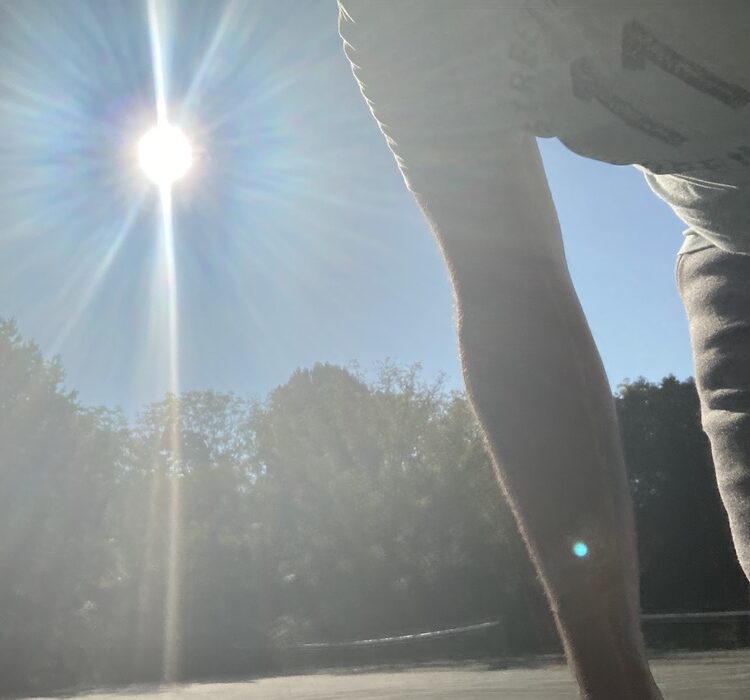
1 — Quadrupedal
That’s all folks! Thought it was fitting to end this series/countdown with a good QM session at my favorite tennis courts. Keep moving, friends :)
Creating something
I’m the obsessive type. I’m ordered and process driven to a fault, but not quite (or at least, only rarely) to the point where this affects my ability to function. I’m continuously thinking about things like can I carry something else if I’m going in a certain direction— which is fine when heading out to run errands with the car, but which can stop me in my tracks, and cause me to turn in circles in place, before moving from room to room. I’m also obsessive about doing things. I’m the guy you want physically setting up your complex computer systems and networks—physically arranging everything. I’m the guy who got really into roller skating, bicycling, skiing, Aikido, scratch-building radio-controlled gliders, sailing… there’s a much longer list.
I learned one lesson on my own over the years and many obsessions: Do or do not. I am unable to “spend less time” on an obsession. I have to lean into it, or let go of it. Many of my obsessions paid off either as income or simply being useful to my personal growth. Being able to assess when continuing an obsession is not going to do either of those things for me is a hard-won skill.
But there are some heuristics you can use to guess whether an obsession might be one that matters. For example, it’s more promising if you’re creating something, rather than just consuming something someone else creates. It’s more promising if something you’re interested in is difficult, especially if it’s more difficult for other people than it is for you. And the obsessions of talented people are more likely to be promising. When talented people become interested in random things, they’re not truly random.
But you can never be sure. In fact, here’s an interesting idea that’s also rather alarming if it’s true: it may be that to do great work, you also have to waste a lot of time.
~ Paul Graham from, The Bus Ticket Theory of Genius
slip:4upage2.
Graham’s point about creation is a second lesson about obsession. I agree, and I think an obsession’s being about creation is critical. I stumbled really near this lesson a few months ago when I wrote Being Genuine for Open + Curious where I wrote…
A great conversation is one where we (and our partners) feel the joy of creation, even if that’s while discussing a contentious topic. We have little chance of being creative if we know, or think we know, where things are headed.
Creation is critical. I need to imagine the world differently, and then try to go and create that new world.
ɕ
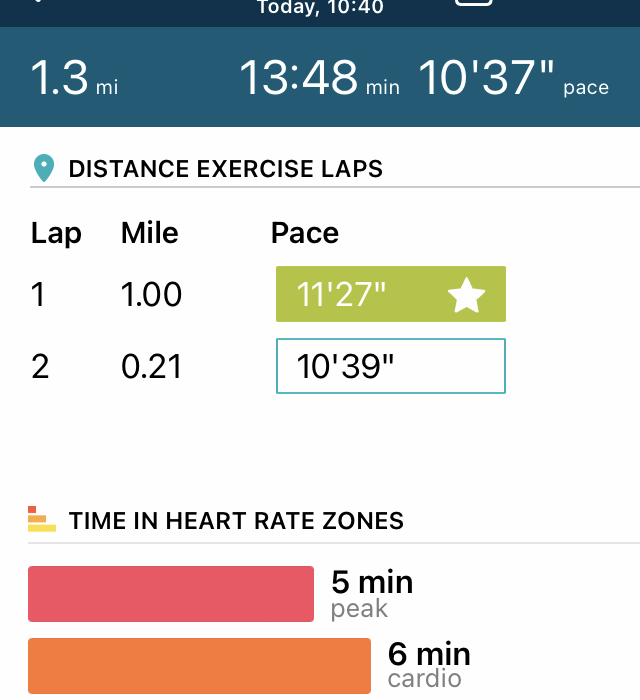
2 — Running
Gak. Slow. On the upside, feeling a little thinner. On the downside… running.

3 — Travel day
This was a long day, packed full of breaking down the campsite, driving, unpacking and cleanup at home. Simply no energy nor initiative to put in a real workout. ¯\_(ツ)_/¯
What to do with twenty minutes
I recently realized I’ve wasted 23 years. Way back in 1990 a good friend gave me a CD of MCMXC A.D. by Enigma. It was mind bending, and remains so; to this day, I use it when I really need to zone out and not quite sleep, but rest. It’s an album which I have never once listened to a single track separately. I’ve only ever started at the front and gone straight through.
The other day, I thought: I should see what else Enigma (the brain child of Michael Cretu) may have done since 1990. Followed by my ordering all of the other seven albums. I buy the CDs used, and that means they tend to trickle to my doorstop over a few weeks. Oh. I’ve turned into a lunatic, listening to music far too loud in the house. I’ve recently done this with other artists and suddenly I’m up to my eyeballs in great (in my opinion) music.
So, why 23 years wasted? The Screen Behind the Mirror was released in 2000. I’ve therefore wasted 23 years worth of opportunities to play it.
Basically I had just aged myself by twenty minutes. Two virtual cigarettes, and not even a fading buzz to show for it. I learned nothing, gained nothing, made no friends, impacted the world not at all, did not improve my mood or my capacity to do anything useful. It was marginally enjoyable on some reptile-brain level, sure, but its ultimate result was only to bring me nearer to death. Using my phone like that was pure loss of life — like smoking, except without the benefits.
~ David Cain from, Most Phone Use is a Tragic Loss of Life
slip:4uramo1.
I’ve no idea if you like Enigma. (You can thank me later if you just discovered Enigma and do like it.) But there simply must be some music that you do like! …find which music it is, buy a copy of it in whatever medium you prefer, and spend that twenty minutes—and the next 23 years, if you’re lucky—leaning into that stuff.
ɕ
4 — Beach three
No image taken. Lots of beach walked upon. I’m calling it a win.
September 03, 2023 — #48
Reading time: About 5 minutes, 1000 words
Get 7 for Sunday in your inbox. → Subscribe here.
This issue is https://7forsunday.com/48
Understanding and compassion
Compassion. The best description (it’s right at the top) and discussion (continues for ~6,000 words) I’ve found is David Gross’s Notes on Compassion.
Empathy, a cycle of skills improvement, developing new attitudes and showing up in service often accompanies the careers of people who get from here to there.
Ambition is insufficient.
~ Seth Godin from, Goals and expectations | Seth’s Blog
slip:4usego1.
There’s a reason the word “understanding” is before “compassion” in my mission. We each have limited resources, and we must be intentional (perhaps not entirely intentional, but certainly not entirely unintentional) with how we act based on compassion. I must first begin to understand myself. Then begin to understand the world, and that includes beginning to understand others.
ɕ
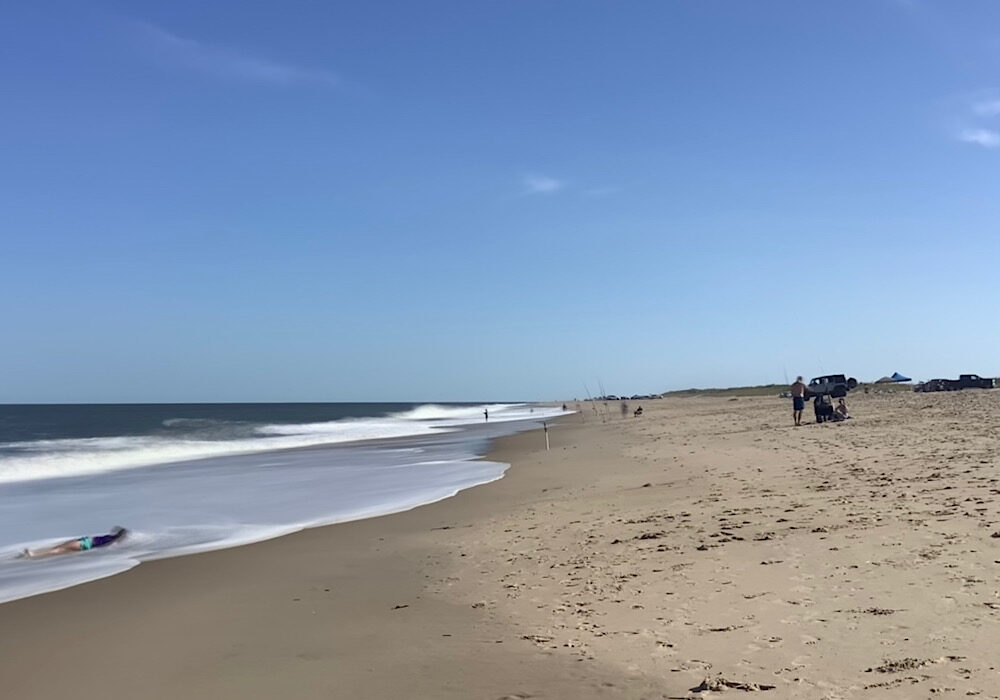
5 — Beach too
Another walk down this beach. Tomorrow: part three I think.
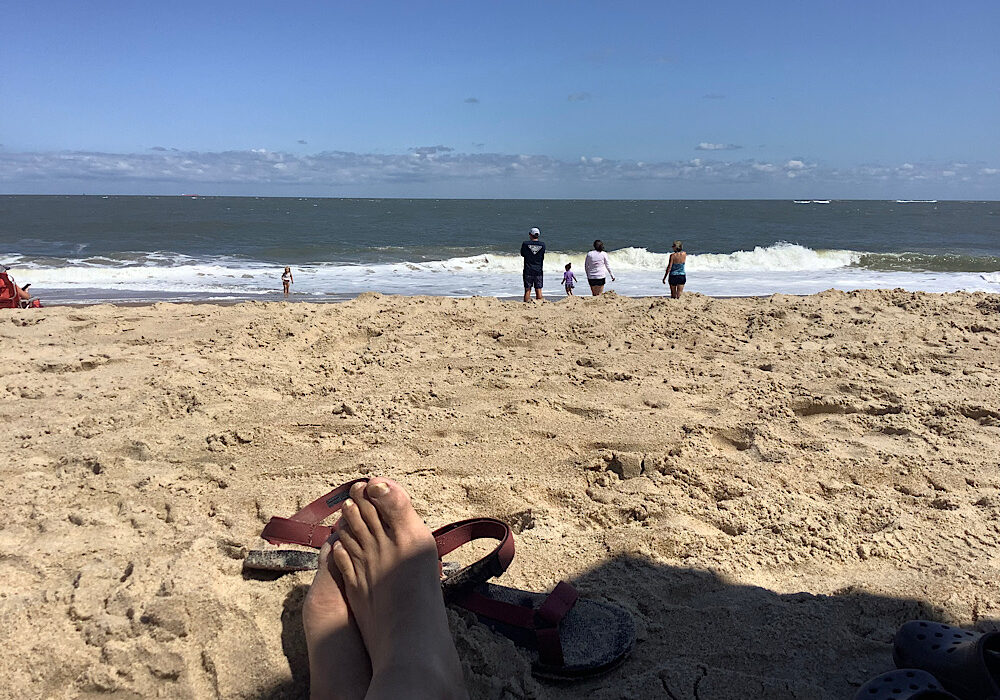
6 — Beach
In addition to holding this chair down, walked an hour up and down the beach. Tomorrow: repeat workout.
Ancients’ philosophy
Clear communication is a sign of understanding. Understanding the idea to be communicated is necessary, but not sufficient, for clear communication. I think in language (I point this out because I wonder if some people don’t think in language) and that leads me to word-smithing. I’m often searching for just the right word or phrase, and then delighted with myself if I find it. Having such labels for larger ideas is a check-point for myself, internally, that I actually have understanding.
Gregory Hays, one of Marcus Aurelius’s best translators, writes in his introduction to Meditations, “If he had to be identified with a particular school, [Stoicism] is surely the one he would have chosen. Yet I suspect that if asked what it was that he studied, his answer would not have been ‘Stoicism’ but simply ‘philosophy.’”
He then notes that in the ancient world, “philosophy” was not perceived the way it is today. It played a much different role. “It was not merely a subject to write or argue about,” Hays writes, “but one that was expected to provide a ‘design for living’—a set of rules to live one’s life by.”
~ Ryan Holiday from, 19 Rules For A Better Life (From Marcus Aurelius) – RyanHoliday.net
slip:4uryru1.
Just because I have a label for something—Stoicism in this case—doesn’t mean I label myself as that. The obvious reason is that my label has a lot of other context attached (in my mind) and chances are little to none that any of that context is present for another person. Labels are useful as shorthand, but only if we have the shared understanding.
Life is short. There are ends—things I have done which others can observe. There are the means I’ve chosen to those ends. And then there’s justification. I don’t have the time (nor the inclination) to explain everything—and frankly no one wants to hear that much from me (or from anyone.) I just find it interesting when I discover something I do (or say or think) for which I’ve not really thought through the labels… thought through the justification.
ɕ
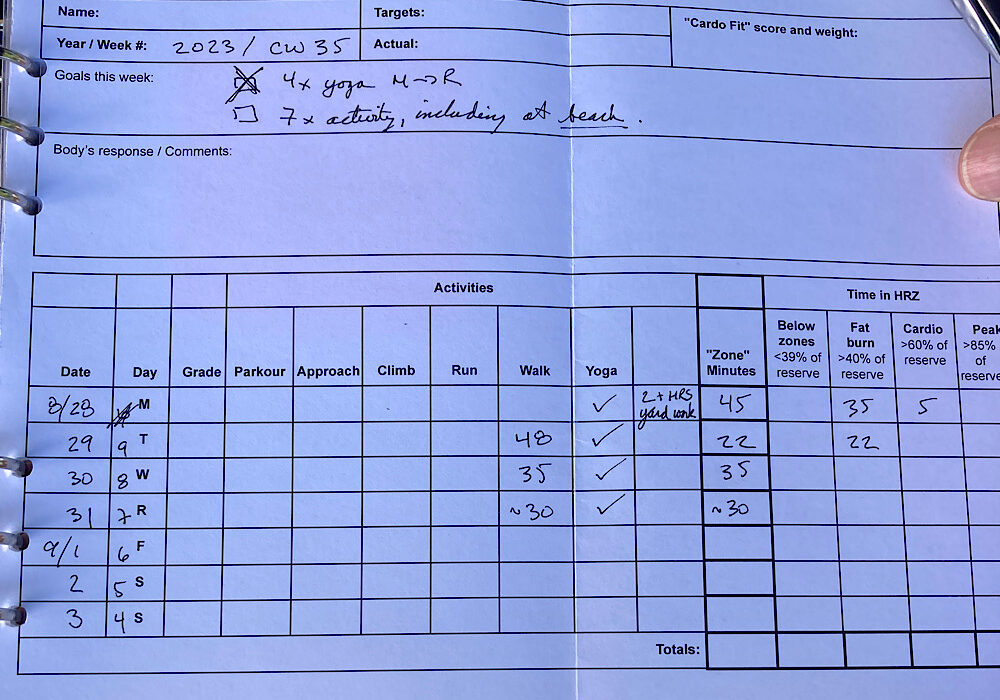
7 — Walk
Amazing weather today. Still walking. The part I most dislike about doing these many-day activity challenges is taking a photo. Here’s a photo of the sheets I use to track activity and goals.